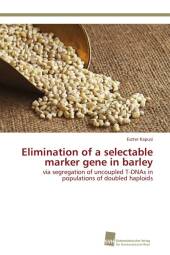 Neuerscheinungen 2012Stand: 2020-01-07 |
Schnellsuche
ISBN/Stichwort/Autor
|
Herderstraße 10
10625 Berlin
Tel.: 030 315 714 16
Fax 030 315 714 14
info@buchspektrum.de |

Eszter Kapusi
Elimination of a selectable marker gene in barley
via segregation of uncoupled T-DNAs in populations of doubled haploids
2012. 128 S. 220 mm
Verlag/Jahr: SÜDWESTDEUTSCHER VERLAG FÜR HOCHSCHULSCHRIFTEN 2012
ISBN: 3-8381-3565-2 (3838135652)
Neue ISBN: 978-3-8381-3565-6 (9783838135656)
Preis und Lieferzeit: Bitte klicken
Barley represents one of the economically most important and widely distributed crops worldwide, and genetic engineering is expected to play a crucial role in its further improvement. However, once transgenic plants are obtained, the selectable marker gene is not necessary anymore or even unwanted, and thus viable means to circumvent the use of selectable markers or to remove them from transgenic plants are required. In the present study, a novel strategy has been pursued to generate selectable marker-free transgenic lines instantly homozygous for the gene-of-interest. Primary co-transgenic plants (T0) containing both the selectable marker gene (hygromycin phosphotransferase) and a model gene-of-interest (ß-glucuronidase) were produced via Agrobacterium-mediated gene transfer using two independent T-DNAs. Both removal of the selectable marker and establishment of instant homozygosity of the gene-of-interest was then achieved at a time through segregation of uncoupled T-DNAs in populations of doubled haploid (DH) lines produced from the T0 plants via embryogenic pollen culture.
Eszter Kapusi, Dr. rer. nat.: M.Sc. in Biology and Chemistry, Eötvös Loránd University, Budapest, Hungary. Ph.D. at the Martin Luther University of Halle-Wittenberg, Halle (Saale), Germany.


